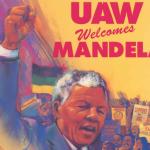Nelson Mandela: Union Man

Nelson Mandela was a union man.
Long aligned with the Congress of South African Trade Unionists, Mandela framed his presidency with a declaration that: “The kind of democracy that we all seek to build demands that we deepen and broaden the rights of all citizens. This includes a culture of workers’ rights.”
In South Africa, as a young campaigner for racial justice, Mandela was profoundly influenced by the 1946 African Mine Workers Union strike. He learned organizing skills from AMWU activists and would become a champion of the miners, telling workers, “It is your sweat and blood that has created the vast wealth that white South Africa enjoys.”
Mandela, the African National Congress leader, Nobel Prize winner and first president of the new South Africa, who died Thursday at age 95, recognized the organization of workers as a part of the freedom struggle and of the formation of a just society.
Unlike so many leaders who rise of power with the support of organized labor but then distance themselves from the movement, Mandela never broke the bond. He proudly served to the end of his days as the honorary president of South Africa’s National Union of Mineworkers. He declared himself to be “fully committed to the protection of the integrity of the collective bargaining system.” And he spoke movingly about how the “international solidarity of workers of the world enables us to learn from each other, to support each other and strengthen our ties in the face of multinational strategies for profit maximization and exploitation.”
For generations to come, there will wide-ranging and appropriate discussion of Mandela’s remarkable contributions to our understanding of freedom, democracy, tolerance and basic human relations.
Yet, it is that understanding of international solidarity that comes to mind when people ask me about the years when I covered Mandela in South Africa and on his global travels. I saw it most powerfully during his remarkable twelve-day visit to the United States in 1990, which came just four months after his release from the Victor Verster Prison. Mandela addressed the Congress and the United Nations and visited with the president of the New York Stock Exchange. And he went to Detroit, where he was determined to thank members of United Auto Workers Local 600 for their early and militant opposition to apartheid.
The machines stopped at the Ford Motor Company’s River Rouge plant in Dearborn in June 1990. Workers held aloft unfurled “Local 600” banners to welcome the South African leader on what was dubbed his “Freedom Tour.” When Mandela finally appeared, he was greeted by United Auto Workers president Owen Bieber and vice president Ernie Lofton. Mandela recalled the struggle to organize the plant in the 1930s and told the assembled workers: “It is you who have made the United States of America a superpower, a leader of the world.”
Bieber produced a UAW lifetime membership card and Mandela held it aloft, displaying it to the cheering crowd of autoworkers. Then, wearing a UAW jacket and hat, a beaming Mandela stepped to the microphone and declared, “Sisters and brothers, friends and comrades, the man who is speaking is not a stranger here. The man who is speaking is a member of the UAW. I am your flesh and blood.”
